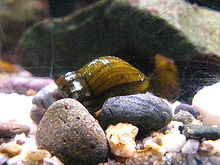Semisulcospira kurodai
| Semisulcospira kurodai | |
|---|---|

| |
| A live individual of Semisulcospira kurodai viewed through the glass of an aquarium | |
| Scientific classification | |
| Domain: | Eukaryota |
| Kingdom: | Animalia |
| Phylum: | Mollusca |
| Class: | Gastropoda |
| Subclass: | Caenogastropoda |
| Family: | Semisulcospiridae |
| Genus: | Semisulcospira |
| Species: | S. kurodai |
| Binomial name | |
| Semisulcospira kurodai Kajiyama & Habe, 1961[1] | |
Semisulcospira kurodai is a species of freshwater snail with an operculum, an aquatic gastropod mollusc in the family Semisulcospiridae. Before 2009, this species was classified in the family Pleuroceridae.

Description
The maximum width of the shell of Semisulcospira kurodai is 13.3 millimetres (0.52 in)[2] and 52.0 millimetres (2.05 in) in height in the laboratory.[2] The maximum weight of the animal in the laboratory is 7.7 grams (0.27 oz).[2]
The width of the shell is 10.3 millimetres (0.41 in) in the first year, 11.0 millimetres (0.43 in) in the second year, 11.5 to 11.8 millimetres (0.45 to 0.46 in) in the third year and 12.0 millimetres (0.47 in) in the fourth year in the laboratory.[2]
The diploid chromosome number of Semisulcospira kurodai is 2n=35 and 2n=36 (both chromosome numbers were observed).[3]
Distribution
This species occurs in Japan.
Ecology
Habitat
Semisulcospira kurodai lives in rivers and in ponds.[4]
Life cycle
The female has 17 to 72 embryos in its brood pouch.[4] One female can give life to 62 to 79 newborn snails in the laboratory.[2]
The average size of the shell of a newborn snail varies according to the locality from 1.2 to 1.4 millimetres (0.047 to 0.055 in) in width and from 1.9 to 2.1 millimetres (0.075 to 0.083 in) in the height of the shell.[4]
Semisulcospira kurodai can live up to four years in the laboratory.[2]
References
- ^ (in Japanese) Kajiyama H. & Habe T. (1961). "Two new forms of the Japanese melanians; Semisulcospira". Venus 21(2): 167-176. page 173. fig. 1-3.
- ^ a b c d e f (in Japanese) Takami A. (1995). "室内飼育におけるクロダカワニナの成長と産仔数 [Growth and Number of Newborns in Semisulcospira kurodai (Prosobranchia: Pleuroceridae) Reared in the Laboratory]". Venus 54(2): 123-132. CiNii.
- ^ Davis G. M. (1969). "A taxonomic study of some species of Semisulcospira in Japan (Mesogastropoda: Pleuroceridae)". Malacologia 7: 211-294.
- ^ a b c (in Japanese) Takami A. (1997). "クロダカワニナの分布と成貝および新生貝の種内変異 [Distribution and Intraspecific Variation in Adult and Newborn Shells of Semisulcospira kurodai (Prosobranchia: Pleuroceridae)]". Venus 56(4): 305-317. CiNii.
Further reading
- (in Japanese) Goto T. (1994). "岐阜県のクロダカワニナ [Semisulcospira kurodai Kajiyama & Habe in Gifu Prefecture]". ちりぼたん The Chiribotan 24(3-4): 100-101. CiNii
- Oniwa K. & Kimura M. (1986). "Genetic variability and relationships in six snail species of the genus Semisulcospira". The Japanese journal of genetics 61(5): 503-514. CiNii. doi:10.1266/jjg.61.503
- (in Japanese) Takami A. (1995). "31. クロダカワニナの産仔数, 新生貝の大きさと成長(平成 6 年度大会(豊橋)研究発表要旨) [31. Number, size and growth of newborns in Semisulcospira kurodai under the laboratory conditions (Abstracts of Papers Presented at the 1995 Annual Meeting in Toyohashi City)]". Venus 54(1): 96. CiNii
- (in Japanese) Takami A. (1991). "カワニナ属 3 種の産仔頻度, 産仔数と新生貝の大きさ [The Birth Frequency, Number and Size of Newborns in the Three Species of the Genus Semisulcospira (Prosobranchia: Pleuroceridae)]". Venus 50(3): 218-232. CiNii.
